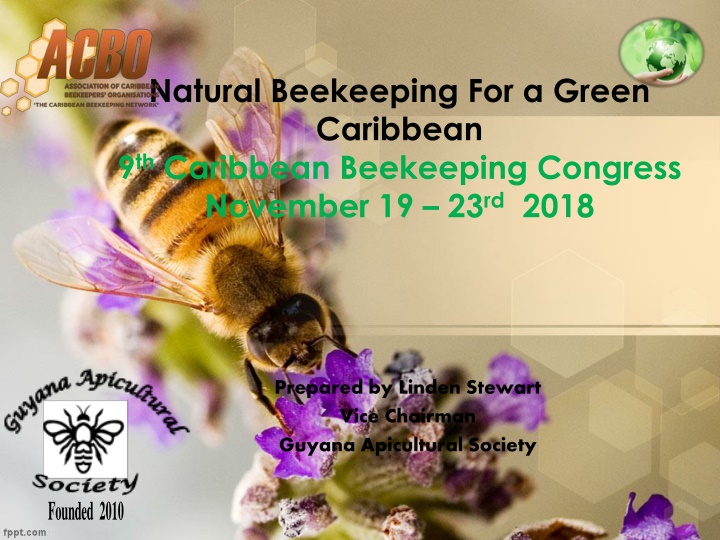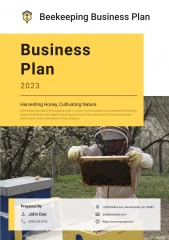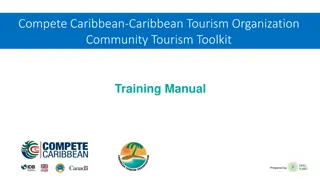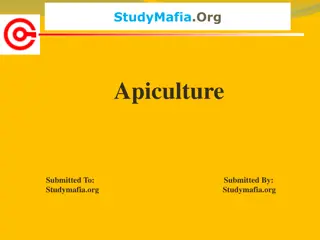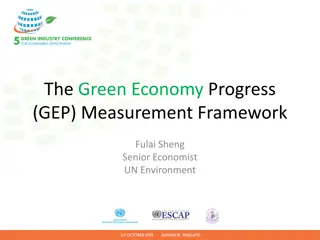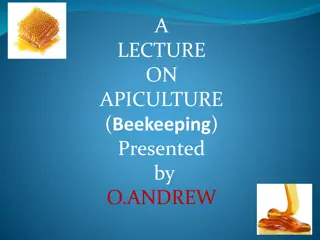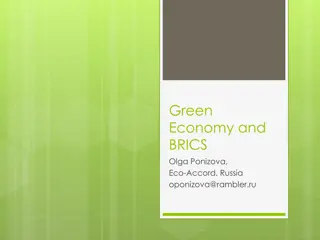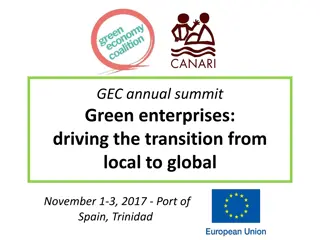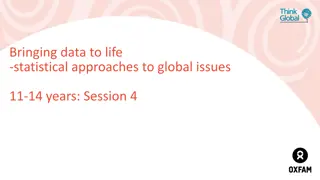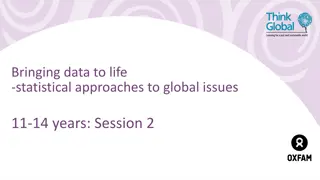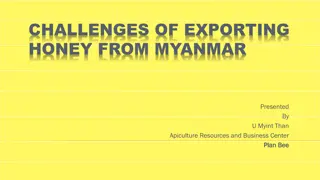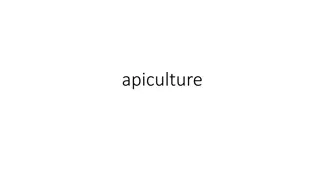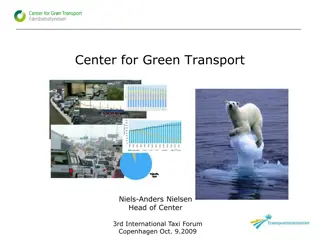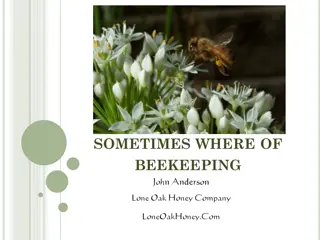Sustainable Beekeeping Initiatives for a Green Caribbean at the 9th Caribbean Beekeeping Congress
Addressing challenges such as poverty, food security, deforestation, and climate change, the focus is on promoting beekeeping in Guyana as a key component of the Green State Development Strategy. Beekeeping plays a critical role in pollination, ensuring the survival of plants and agriculture. Previous initiatives in rural communities have laid the groundwork for sustainable apiculture. The aim is to secure the environment through beekeeping and contribute to a greener, more sustainable future for the Caribbean.
Download Presentation

Please find below an Image/Link to download the presentation.
The content on the website is provided AS IS for your information and personal use only. It may not be sold, licensed, or shared on other websites without obtaining consent from the author.If you encounter any issues during the download, it is possible that the publisher has removed the file from their server.
You are allowed to download the files provided on this website for personal or commercial use, subject to the condition that they are used lawfully. All files are the property of their respective owners.
The content on the website is provided AS IS for your information and personal use only. It may not be sold, licensed, or shared on other websites without obtaining consent from the author.
E N D
Presentation Transcript
Natural Beekeeping For a Green Caribbean 9thCaribbean Beekeeping Congress November 19 23rd2018 Prepared by Linden Stewart Vice Chairman Guyana Apicultural Society Founded 2010
Challenges to be Addressed There are many challenges that need to be addressed, - Poverty, - Food Security, - Deforestation and Climate Change
A Green State Through Beekeeping - Securing our forest for the benefit of the planet through the Green State has been a good move for Guyana. - As set out in the Draft for Consultation, Guyana plans to focus initially on three low-carbon economic sectors fruits and vegetables, aquaculture and sustainable forestry. - The expansion of these sectors cannot take place without the simultaneous development of the apiculture or the beekeeping sector in Guyana. - The honeybee is a major agent of pollination, and recent studies have suggested that mankind would only survive approximately four years on the planet, should the honeybee become extinct. - Pollination, as you know, is the process by which new seeds are formed to produce new trees, and eventually new fruits and vegetables. No bees therefore means no trees no fruits and no vegetables!
Apiculture should be a key component of the For a Green Guyana Guyana has approximately 80% of its land area covered with forest - an area which has a blend of seasonal, dry evergreen, mountain, swamp, marsh, mangrove and mixed forests which provides a habitat to approximately; 8,000 plant species and In excess of 1,000 species of terrestrial vertebrates.
Apiculture should be a key component of the Green State Development Strategy
Apiculture should be a key component of the Green Economy
Experiences and Work already Done In 2001 a project was started in the Upper Mazaruni to encourage organized beekeeping in rural communities, with emphasis on sustainability. The project saw the initial setting up of 30 hives in 5 communities.
Experiences and Work already Done In September 2009, under sub project KfW-EPA-GPAS, through the Office of the Prime Minister, there was the commencement of setting up 200 additional hives in 7 communities Kako, Jawalla, Purima, Waramadong, Warawattam, Quebenang and Kamarang. Each village has completed building all their own boxes and hive stands, Even sewing eleven bee suits. At the end of that year about six (6) gallons of honey was extracted from the apiaries of the Waramadong Secondary School, and villagers were taught how to make bees wax candles.
Experiences and Work already Done In 2011, FAO/IICA collaborated with the Youths of Aliki on the Essequibo River to establish 11 hives and to date there exists approximately 30 functioning hives. The technology was also transferred to the Tri-Lake Area on the Essequibo Coast where some training was conducted.
Experiences and Work already Done In 2013 under a partnership with Partners of the Americas and IICA, Guyana benefitted from diagnostic test for diseases, pests and pesticides residues in pollen. Guyana was declared free from the presence for diseases and major pests due to the fact that our bees (Africanised) are resistant to all pests and diseases found in the world. Further there were very low traces of pesticide residues
Recent Beekeeping projects Food for the poor introduced beekeeping and provided training to Farmers in Region 5 Georgetown Chamber of Commerce Inc conducted a 2 week beekeeping training Seminar as part of their SME programme for 18 beekeepers in November 2017 MOTP Youth Empowerment Program is conducting training for youth in beekeeping in July 2018 Perone Hive Pilot - IICA
Apiculture the Way Forward Bees maintain biodiversity by pollinating wild plants and cultivated crop Floral diversity is linked to pollinator diversity Key elements of food webs Maintenance of natural areas, parks and gardens 90% of wild flowers rely on pollination for reproduction
Apiculture .the Way Forward Honey is a global food commodity, known and used in every country. Beeswax, Propolis royal jelly And Pollen, generate income Beekeeping is possible for people with few resources to practice; bees are obtained from the wild; equipment can be made locally; bees do not need the beekeeper to feed them.
Apiculture. the Way Forward Bees collect the nectar and pollen in flowers - possible for landless people. Wild, uncultivated, mined and wasteland areas all have value for bees. Bees facilitate provide bonus crops owing to their industrious nature of transferring pollen in when they service flowers. Bees do not exert pressures on the land like other forms of industry, so a True Green State can be realised without Deforestation, loss of Bio Diversity or other ill effects of Development. Bees are not in competition with traditional crops but complement their production. (In fact the presence of bees enhances the yield of crops which need a pollinator.)
Apiculture the Way Forward Other sectors benefit from trade, by making equipment and secondary products
Apiculture the Way Forward Beekeepers have incentive to conserve the environment: ensuring that flowers are available and bees are protected. Beekeeping is non-extractive generating income without destroying habitat. Bees can be kept by people of all ages. Bees do not need daily care. Beekeeping can be done when other work allows. Beekeeping is possible in adverse conditions.
ACBO Congress record 9th CBC is the 20th Anniversary of the congress. Congress Number Date Year Host Country 1 17- 20 November 1998 Tobago 14-18th August 2 2000 Nevis 16-20th September 3 2002 Jamaica 14th 18th November 4 2005 Trinidad 10th 14th November 5 2008 Guyana 23rd 27th May 6 2011 Grenada 26th -30th May 7 2013 USVI 12th 16th September 8 2016 Tobago
9th Caribbean Beekeeping congress November 19-23rd 2018 Key benefits to Guyana Expose 120 new Beekeepers to beekeeping Expose 50 existing local beekeepers to international best practices Discuss regional challenges to Api trade in the Caribbean to develop export potential Promote local api products to Caribbean visitors to boost local beekeeping businesses
Creation of green jobs Manufacturing of wood ware for hives, pollen traps Manufacturing of soap, cosmetics and polis from bees wax Leather craft and shoe making Api therapy Beekeeping tours and safari Promote the rearing of stingless honey bees for production of honey and pollination of west inidan cherry orchards
MOA Support request Sponsorship of Guyana School of Agriculture for Congress. Media Farmers connection, DPI, MOA web site access for congress communication Hosting of 3 international beekeeping professionals ( Pro. Tom Sealey Cornel University USA, Dr. Nicola Bradbear BFD, Dr. David De Jong USP, Brazil) Logistical support of GLDA, NARIE, MOA
MOA Support Request Sponsorship of Students registration from GSA, FOA- UG Consider the Queen Sponsor for the Congress Message for the Conference programe. Invitation of Caribbean Ministers and Agriculture professionals to the congress
9th CBC Budget Item No. Activity Cost Guyana Dollars Remarks 1 Guyana School of Agriculture 0.4 M MOA 2 Meals 2.1 M Congress fees 3 International Guests (4) 3M MOA 4 Packages and magazine 2M Private Sector sponsors 5 Tours and transportation 1M MOE, GPF MOA 6 Welcome reception 0.5M MOTP/ ASDU 7 Congress Admin 2M Congress fees TOTAL 11M
